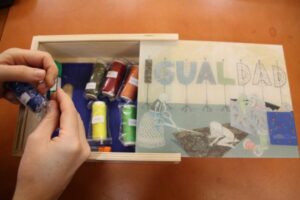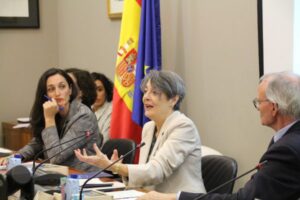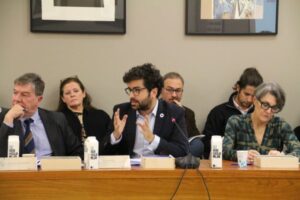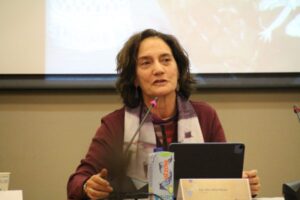
23/11/2022
The Economic and Social Council in Madrid hosted yesterday the FIIAPP event 'Seams for social cohesion' in which we addressed the achievements of the dialogue between Latin American and European institutions to solve inequality gaps through the EUROsociAL program.
In recent years, Latin American and European institutions have worked hand in hand to sew and close inequality gaps. In five years of the European EUROsociAL+ program, co-led by the FIIAPP, we have exchanged experiences and knowledge between institutions with a clear orientation: to increase social cohesion through public policies.

More than 30 Spanish institutions involved in the EUROsociAL+ program have made important stitches in this sewing workshop, so yesterday we celebrated what we have managed to spin together and discussed the work to be done in the future.

During the inauguration, the director of the FIIAPP, Anna Terrón, pointed out that “social cohesion is the key to our societies, both in Europe and Latin America. We put equality, equity, at the center of the societies we want”.

For her part, the Director of Social Affairs and Public Administration of the FIIAPP, Peggy Martinello, thanked the Spanish institutions for “their enormous involvement in the EUROsociAL+ program to strengthen inclusive societies. She also recalled that the program “has connected more than 600 institutions in Latin America and Europe and has documented more than a thousand results supporting policies on equality, territory, employment, justice and development”.
The president of the CES, Antón Costas, welcomed the institutions, mentioning that “we are living in a time of uncertainty and in the face of this, we need policies and institutions that sew, that face the current challenges”.
From the narrative of sewing, the head of Governance of the FIIAPP in EUROsociAL, Sonia González, gave the floor to the institutions present to address the different topics proposed, pointing out that “sewing involves interweaving fabrics with a needle. Needle and thread are the institutions, which have to sew societies tailored to social cohesion”. The topics addressed were Access to Justice, Public Finances, Territory, Gender, Transparency and Fight against Corruption, Social Contract and Spanish Cooperation System.
Among other institutions and organizations, there were representatives from the Spanish Agency for International Development Cooperation (AECID), the Carolina Foundation, the Conference of Ministers of Justice of Ibero-American Countries (COMJIB), the Ibero-American Association of Public Prosecutors (AAIAMP), the Institute of Fiscal Studies (IEF), the Ministry of Finance and Public Function, the Provincial Council of Barcelona, the Regional Government of Extremadura, the Government Delegation against Gender Violence and Oxfam.

The first topic addressed was the role of justice and the importance of making it accessible to all people. The Secretary General of COMJIB, Enrique Gil Botero, who has worked with FIIAPP to ensure access to justice, stressed that “the agreement on access to justice will be the first in the world to preserve the fundamental right of access to justice for all people”. For his part, the secretary general of the AAIAMP, Francisco Jiménez-Villarejo, pointed out that “cooperation between justice institutions is essential: we need trust and empathy between judges, prosecutors and all those involved in justice”.
In this panel, the director of the Institute of Fiscal Studies, Alain Cuenca, highlighted the need for “an independent and experienced tax administration to strengthen public revenue and finance public policies that reduce inequality”.
Lucía De Castro, Deputy Inspector to the Head of the International Relations Coordination Unit of the State Tax Administration Agency (AEAT), also intervened to explain the inspiring role of the AEAT for Latin American administrations. The Director of Public Expenditure of the Independent Authority for Fiscal Responsibility (AIREF), José María Casado, addressed the importance of evaluating public policies. In addition, the General Secretary of Autonomous and Local Financing (SGFAL), Inés Olóndriz, pointed out the lessons learned from the Spanish experience with its financing system that can be useful to Latin America.
Among others, the Director General of External Action of the Regional Government of Extremadura, Rosa Balas, addressed this topic, stating that “we must bet on quality public policies that reach the territories, work at regional level and bet on cross-border cooperation”. For his part, the Director of International Relations of the Diputació de Barcelona, Antonio Montseny, expressed his concern about the “distancing of citizens from the institutions” and stated that “it is necessary to promote action from the local level to sew up inequality gaps”.
EUROsociAL+ has combined cross-cutting actions with specific actions aimed at women and, coinciding with the week of the International Day for the Elimination of Violence against Women, this has been one of the central themes of the meeting.
The Deputy Director General of Inter-institutional Coordination on Gender Violence of the Government Delegation, Macarena Gamir Linares, and the Director General of Democratic Reforms of the Generalitat Valenciana, José García Añón, both institutions that have become a model to follow for the cooperation that EUROsociAL+ facilitates on gender issues, have participated in this topic.
In addition, the program has been a pioneer in analyzing the differentiated impacts of corruption on women. Many countries are taking steps to criminalize sexual extortion. In this line, the magistrate in the Second Chamber of the Supreme Court, Carmen Lamela, pointed out that “EUROsociAL has put this problem on the agenda and has facilitated the joint work of justice and equality institutions”.
Dialogue between institutions and civil society facilitates the participation of civil society in the construction of public policies.
In this sense, the programmatic director for Latin America and the Caribbean of Oxfam, Andrea Costafreda, has expressed that “civil society contributes to radicalizing agendas: going to the root of the problems, taking institutional agendas to talk about intersectionality or the challenges of transitions”.
During his speech, the director of the AECID, Antón Leis, stated that “behind the current challenges to democracy there is a demand for more and greater democracy on the part of societies”. For his part, the director of the Carolina Foundation, José Antonio Sanahuja, stressed the need to “always incorporate mutual learning in cooperation and bear in mind that the triple transition can only happen if it is just”.
Many of these seams, stitched together by institutions on both sides of the Atlantic, have been well tied and have contributed to closing gaps in areas such as access to justice, taxation, governance and gender. On some occasions, especially in the last two years in response to the timing of the pandemic, we have done so in the form of a darned to protect the most vulnerable with emergency solutions. But it is precisely the work of public policies that allows for another form of stitching: from the patterns, designing tailor-made models, with institutional fabrics that last over time.
The Secretary General of the FIIAPP, Inma Zamora, closed the event by pointing out that “today we have stitched together with all the institutions the implication towards social cohesion, because by making small stitches, we close large gaps”.





